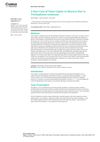 May 2023 in “Stem cell research & therapy”
May 2023 in “Stem cell research & therapy” New method efficiently isolates hair growth cells from newborn mouse skin.
[object Object]  1 citations,
November 2002 in “Neurosurgery Clinics of North America”
1 citations,
November 2002 in “Neurosurgery Clinics of North America” The article concludes that cranial reconstruction should aim for the best aesthetic result, using various techniques tailored to individual needs and conditions.

Losing weight and eating better are key to managing metabolic syndrome and its related conditions.
2 citations,
December 2023 in “International journal of molecular sciences” Understanding keratinization is crucial for treating skin conditions like ichthyoses and psoriasis.
 6 citations,
February 2023 in “Journal of nanobiotechnology”
6 citations,
February 2023 in “Journal of nanobiotechnology” The new anti-acne treatment HA-P5 effectively reduces acne by targeting two key receptors and avoids an enzyme that can hinder treatment.
8 citations,
September 2005 in “Practical diabetes” PCOS is a condition causing irregular periods, excess male hormones, and infertility, often managed by targeting insulin resistance and specific symptoms.
 1057 citations,
November 2011 in “Annals of Biomedical Engineering”
1057 citations,
November 2011 in “Annals of Biomedical Engineering” Low-level Laser Therapy may help reduce inflammation, pain, and aid healing, but more research is needed to confirm its effectiveness and establish standard treatment guidelines.
May 2024 in “Frontiers in Nutrition” Turning food waste into useful products is key for a sustainable economy.
 14 citations,
July 2021 in “Biomedicines”
14 citations,
July 2021 in “Biomedicines” Platelet-rich treatments can help improve wound healing and tissue repair.
 92 citations,
December 2012 in “Current opinion in genetics & development”
92 citations,
December 2012 in “Current opinion in genetics & development” Turing patterns are now recognized as important in developmental biology.
January 2025 in “Pharmaceuticals” Peptide-based hydrogels are promising for healing chronic wounds effectively.
 28 citations,
September 2013 in “Expert Opinion on Therapeutic Patents”
28 citations,
September 2013 in “Expert Opinion on Therapeutic Patents” New resveratrol-related compounds show promise for treating various health issues but need more research for clinical use.
 January 2024 in “Biotechnology advances”
January 2024 in “Biotechnology advances” Bioassays help find useful compounds in nature for making medicines, supplements, and cosmetics.
 10 citations,
January 2013 in “International Journal of Trichology”
10 citations,
January 2013 in “International Journal of Trichology” Trichoscopy effectively diagnoses early female hair loss, but may need scalp biopsy for confirmation.
8 citations,
July 2021 in “F1000Research” Plant-based compounds might be a promising alternative for prostate cancer treatment with fewer side effects.
 16 citations,
September 2015 in “Journal of Ethnopharmacology”
16 citations,
September 2015 in “Journal of Ethnopharmacology” The document concludes that "Dictamnus" has a rich cultural history and potential as a herbal medicine, warranting more research into its effects and safety.

Additive markers are most common and crucial for text coherence.
 October 2023 in “Al-Anbar medical journal”
October 2023 in “Al-Anbar medical journal” The clinic-based hair fall count method is accurate and reliable.

A Moroccan athlete got a rare scalp infection, stressing the need for better hygiene in sports.
 51 citations,
November 2011 in “British Journal of Dermatology”
51 citations,
November 2011 in “British Journal of Dermatology” A gene called HDAC9 might be a new factor in male-pattern baldness.
 11 citations,
August 2019 in “The Journal of Sexual Medicine”
11 citations,
August 2019 in “The Journal of Sexual Medicine” Women with nonclassic congenital adrenal hyperplasia experience more sexual dysfunction and distress.
 42 citations,
April 2013 in “Steroids”
42 citations,
April 2013 in “Steroids” Non-classic congenital adrenal hyperplasia is a common disorder causing symptoms like acne and infertility, and it's managed based on symptoms, not just test results. Treatment can improve fertility and reduce miscarriage risk.
 February 2023 in “International Journal of Advanced Research in Science, Communication and Technology”
February 2023 in “International Journal of Advanced Research in Science, Communication and Technology” Herbal shampoos with Neem and Tulsi might be safer and more effective for controlling dandruff.
 25 citations,
January 2006 in “Pharmacoepidemiology and drug safety”
25 citations,
January 2006 in “Pharmacoepidemiology and drug safety” SSRIs can cause hair loss, especially sertraline, with higher risk in women.
 January 2025 in “Frontiers in Genetics”
January 2025 in “Frontiers in Genetics” Combining minoxidil and plant extracts improved hair growth in a boy with a rare genetic disorder.
 30 citations,
June 2012 in “Current Opinion in Endocrinology, Diabetes and Obesity”
30 citations,
June 2012 in “Current Opinion in Endocrinology, Diabetes and Obesity” Nonclassic congenital adrenal hyperplasia is a genetic disorder causing hormone imbalances, affecting fertility and requiring personalized treatment.
[object Object]  199 citations,
April 2010 in “Nature”
199 citations,
April 2010 in “Nature” A gene called APCDD1, which controls hair growth, is found to be faulty in a type of hair loss called hereditary hypotrichosis simplex.
 24 citations,
January 2011 in “International Journal of Trichology”
24 citations,
January 2011 in “International Journal of Trichology” Light microscopy is useful for diagnosing different hair disorders.
11 citations,
January 2013 in “International Journal of Trichology” Emotional factors are crucial in treating and preventing scalp neurodermatitis and hair loss.
 February 2014 in “Medicine - Programa De Formación Médica Continuada Acreditado”
February 2014 in “Medicine - Programa De Formación Médica Continuada Acreditado” The document concludes that non-scarring alopecias can be reversed, but scarring alopecias cause permanent hair loss.
























